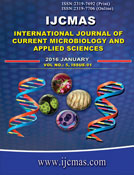


 National Academy of Agricultural Sciences (NAAS)
National Academy of Agricultural Sciences (NAAS)

|
PRINT ISSN : 2319-7692
Online ISSN : 2319-7706 Issues : 12 per year Publisher : Excellent Publishers Email : editorijcmas@gmail.com / submit@ijcmas.com Editor-in-chief: Dr.M.Prakash Index Copernicus ICV 2018: 95.39 NAAS RATING 2020: 5.38 |
Neonatal sepsis forms the most common cause of mortality in the first month of life in developing countries. Klebsiella species are the most commonly implicated pathogen in neonatal sepsis. Carbapenem-resistant Klebsiella pneumoniae is associated with high morbidity and mortality. The study was undertaken in the department of Microbiology, Punjab Institute of Medical Sciences, Jalandhar when in the month of August 2014 , a sudden rise in positive blood cultures due to phenotypically identical Klebsiella pneumoniae from samples received from neonatal intensive care unit raised an alarm. Out of total 23 blood culture samples obtained from neonates, 12 were positive for Klebsiella pneumoniae subspecies aerogenes. Outbreak investigation revealed the similar growth from 3 different sites of NICU (2 from work surfaces and 1 from medicine trolley). Antibiogram typing revealed that all the isolates belonged to a single strain. The strain was multidrug resistant and tested positive for carbapenemase production by Modified Hodge test. The main cause behind outbreak was found to be breach in infection control measures. The study focuses on the prevention of nosocomial outbreaks by stringent infection control measures and judicious use of antibiotics in hospital settings.
 |
 |
 |
 |
 |